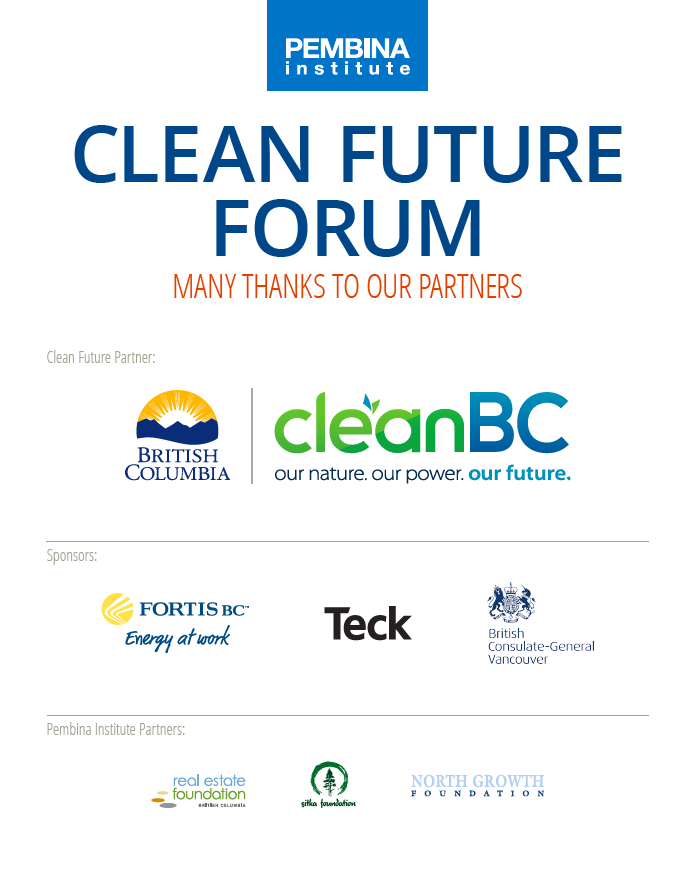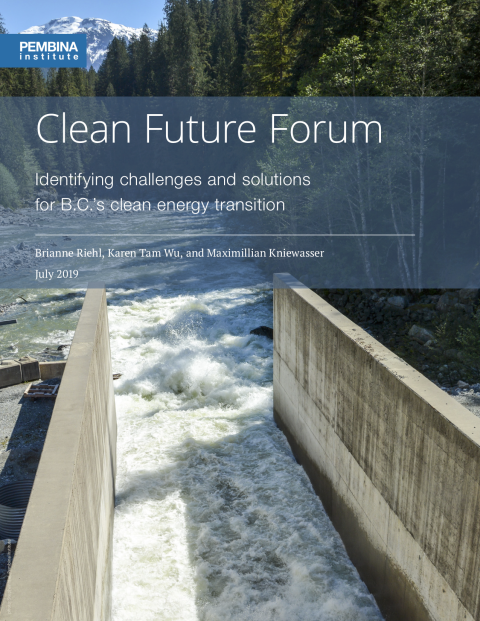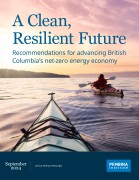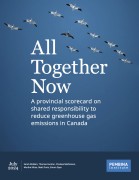The stated objective of British Columbia’s CleanBC plan is to shift B.C. from an economy powered by oil and gas to one increasingly powered by clean energy. To discuss the expected implications of this commitment for B.C.’s energy system, the Clean Future Forum brought together a diverse group of thought leaders on B.C.’s clean energy future. The forum aimed to identify and stimulate discussion of the challenges and opportunities associated with developing clean energy sources and technology at the pace and scale necessary to make B.C.’s clean energy transition a reality.
Broad agreement emerged among participants around three key findings:
- the importance of increased engagement among B.C.’s climate and energy thought leaders to enable collective problem-solving
- support for the economic opportunity in embracing clean energy options and transitioning to a clean economy
- the need for a diversity of clean energy solutions to reduce fossil fuel dependence across B.C.’s economy.
Key challenges to achieving B.C.’s clean energy transition were identified, including the need for:
- Clarity on B.C.’s clean energy resource potential, future demand, matching best-suited energy supply with demand, and the role of utilities in supporting B.C.’s clean energy transition
- Certainty in infrastructure development and utilization, and in policy that allows for long-term planning and investment in infrastructure and research and development
- Support for overcoming the cost differential between gas and electricity in sectors of the economy that rely on natural gas; for research and development initiatives in the clean tech sector; and for leveraging B.C.’s clean tech leadership to maximize economic benefits
- Capacity building to increase awareness and to successfully develop B.C.’s clean energy resources.
Discussion between experts at the forum also raised several potential solutions that could be pursued to overcome these challenges. The identified solutions fall under five key themes:
- resources, infrastructure, and technology
- policy and regulation
- utility design and rates
- community engagement
- research.
Based on these areas of strong agreement or consensus, we recommend the creation of a clean energy plan for B.C. This plan should:
- be the foundation for implementing the vision described in CleanBC
- bring together the work and studies currently underway (such as the B.C. Hydro Phase 2 transformational review, update of the bioenergy strategy, and hydrogen roadmap)
- provide clear policy guidance for regulators, utilities, and energy developers
- provide certainty to investors and businesses about B.C.’s clean energy future
- make use of the wide range of policy levers, technologies, clean fuels and solutions available
- maintain a flexible and reliable energy sector in the province.
In order to outline a pathway for B.C. to power its 2030 economy in line with our climate targets, and set ourselves up for long-term success beyond 2030, we recommend that the clean energy plan:
- Clarify future energy demand and its alignment with best-suited energy resources
- Focus on capacity building, especially in rural areas, to increase the province’s clean energy development potential and foster economic opportunity
- Leverage existing infrastructure and plan and build local support for new low-carbon infrastructure
- Define and update the role that utilities play in supporting B.C.’s stated objective to transition to a clean energy economy
- Outline how made-in-B.C. technology can help achieve our climate targets and serve as a testing opportunity to prove technology readiness to global markets.









